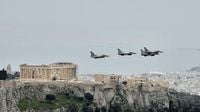Greece is set to invest €25 billion in its defense over the next twelve years, a significant move announced by Prime Minister Kyriakos Mitsotakis during a parliamentary speech on April 1, 2025. This ambitious plan highlights Greece's commitment to modernizing its military capabilities, particularly in light of ongoing tensions with neighboring Turkey and the broader context of rising military expenditures across Europe due to the war in Ukraine.
As part of this investment, Greece already exceeds NATO's defense spending requirement of 2% of GDP, currently allocating nearly 3.5%. Mitsotakis emphasized the necessity for advanced technologies such as drones and highlighted a perceived "production gap" in European defense capabilities. He stated, "What we are proposing is an existential issue for the country — a complete shift in our defense approach, a total change in doctrine," underscoring the urgency of the modernization initiative.
Central to Greece's defense overhaul is the creation of the 'Shield of Achilles', an advanced anti-missile and anti-ballistic system akin to Israel's Iron Dome. This multi-layered defense umbrella will operate across five domains: anti-drone, anti-missile, anti-aircraft, anti-ship, and anti-submarine. Mitsotakis noted that while Greece currently possesses surface-to-air missile systems, such as the Patriot produced by Raytheon and Lockheed Martin, acquiring new systems will take several years due to existing production constraints. He added, "Israel can provide us more quickly," indicating a strategic partnership with the Israeli defense industry.
In a recent meeting with Israeli Prime Minister Benjamin Netanyahu, Mitsotakis discussed the Great Sea Interconnector, an undersea power cable project linking Greece, Cyprus, and Israel, which has received significant EU funding. However, this project has faced delays primarily due to objections from Turkey. As tensions in the region remain high, the Greek government is navigating a complex diplomatic landscape, balancing its defense commitments with the need for ongoing dialogue with Turkey.
Turkey's relations with both Greece and Israel have been strained, particularly following Turkish President Recep Tayyip Erdoğan's recent remarks condemning Israel. On March 30, 2025, Erdoğan criticized Israel during a speech, stating, "May God destroy, destroy Zionist Israel," prompting a swift response from Israeli Foreign Minister Gideon Sa'ar, who described Erdoğan as a "dictator" whose actions are dangerous for the region.
Mitsotakis' defense strategy comes at a time when his party, New Democracy, faces political challenges. Recent polls indicate a decline in support, leading critics to suggest that the Prime Minister is using defense spending as a means to consolidate conservative support amidst rising right-wing populism. Notably, Defense Minister Nikos Dendias, seen as a potential successor to Mitsotakis, has organized events with prominent New Democracy figures who have publicly criticized the Prime Minister's approach toward Turkey.
The overhaul of Greece's military strategy is not merely about increasing spending; it signifies a fundamental shift towards high-tech warfare. Dendias outlined plans for mobile, AI-powered missile systems and drone technologies, moving away from traditional defense methods. This modernization aims to enhance Greece's military readiness while fostering collaboration with local tech startups to bolster innovation.
Additionally, the planned reorganization of military personnel will involve merging units, closing underused bases, and addressing a top-heavy command structure. This approach is designed to create a more agile and responsive military force capable of addressing modern threats.
The urgency of Greece's defense initiatives reflects a broader trend among European nations, many of which are reassessing their military capabilities in response to geopolitical shifts. With the Trump administration signaling a reduction in U.S. commitment to European defense, Greece's proactive stance is particularly noteworthy.
In the context of these developments, Mitsotakis has also dismissed calls from opposition parties to abandon plans to acquire U.S.-made F-35 fighter jets, framing the investment as a critical long-term strategy for Greece's defense posture. His administration's commitment to modernizing the military is expected to be presented to lawmakers in a closed-door session in the coming weeks, as the government seeks to solidify support for its ambitious plans.
As Greece navigates these complex military and political landscapes, the stakes are high. The investment in defense not only aims to bolster national security but also to position Greece as a key player in regional stability amidst ongoing tensions with Turkey and the evolving dynamics of European defense.





